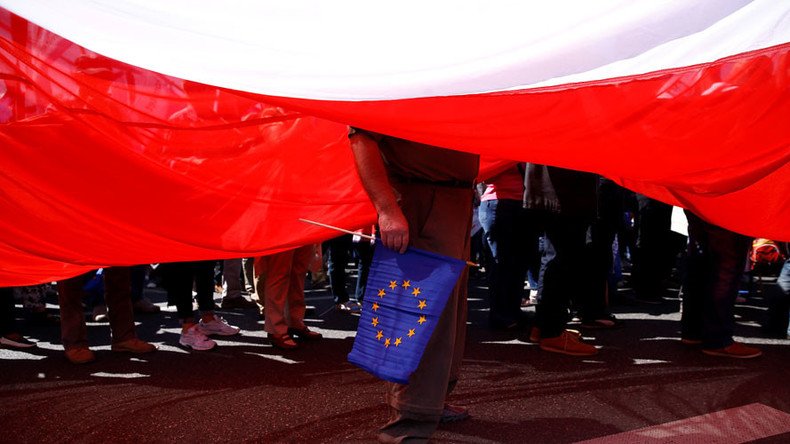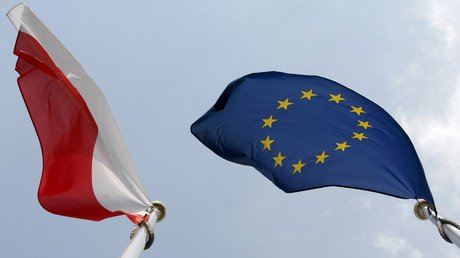Is the EU-Poland romance heading for breakup?

If there was a prize for the favorite ’New Europe’ country of the EU elite over the past couple of decades, then Poland would certainly be in the running for the gold medal.
The Eastern European republic was the country that - in the eyes of the western elites, at least - could do no wrong. Its ‘free market’ economic reforms were lauded. It’s spiky attitude towards Russia and Belarus was applauded. Poland was the great success story that others should copy.
But is the love affair between Brussels and Warsaw coming to an end? This week, the European Commission formally adopted an ‘opinion’ - saying that there is a "systemic risk to the rule of law in Poland" which could even land to imposition of sanctions
Poland’s Justice Minister and Prosecutor General Zbigniew Ziobro said he was "surprised and saddened" by the European Commission's position, labeling it "one-sided."
The cooling of relations can be seen in other ways too. We’ve had a spate of articles in Western publications which used to sing Poland’s praises, now telling us that we all ought to be terribly worried about the direction in which the country is heading.
Ostensibly, the concern is that the populist, nationalist conservative Law and Justice party (PiS), elected last October, is trying to gain control of important state institutions.
The Polish government is also accused of trying to smother the country’s highest court - the Constitutional Tribunal.
In addition a new 'national media' law - which allows for the removal by the government of senior media officials - was passed in December.
Yet another law scrapped the requirement to put senior civil service jobs out to tender - meaning that the party can now appoint its supporters to the highest positions.
But while there are legitimate grounds to criticize the Polish government for its illiberal tendencies and its recent reforms, there’s a lot more to this squabble than meets the eye. There are two sides to every story, but it’s only the EU side that we’re hearing.
The Constitutional Tribunal crisis was provoked by the outgoing EU-friendly Civic Platform-led government appointing five new judges to the court, just before an election they were widely expected to lose. The appointments, which were brought forward from December, would have meant that 14 of the tribunal’s 15 judges had been Civic Platform appointees.
PiS regarded this as an undemocratic attempt to ‘block’ future legislation by the new Polish government.
The PiS position is that in order to be able to fulfill their democratic mandate (in October they got of 37.8 percent of the vote and became the first party to win an outright majority in an election in Poland since the political changes of 1989), they needed to tackle the problem of their opponents still holding key levers of power after election defeats.
The PiS reforms can be seen as an attempts at a ‘power grab,' but attempts by Civic Platform supporters to block the party from carrying out its program, for which it clearly has a mandate, can be seen as undemocratic too.
In any case, the EU’s attacks on the Polish government look hypocritical bearing in mind the lack of concern they have shown regarding undemocratic developments in other countries in Europe in recent years.
The EU stayed silent when the youth organization of the Communist Party of Bohemia and Moravia in EU member-state the Czech Republic was banned in 2006. This went into effect on the spurious grounds that its program violated the Czech constitution because it called for public ownership of the means of production.
"Could you show me one civilized country where people with an alternative opinion, people without a single drop of blood on their hands, no violence, nothing similar, are banned simply for their opinions," asked Dr Josef Skala, a foreign policy adviser to the Czech Communist Party.
But the EU bigwigs, who want us to believe they are so concerned about ‘democratic freedoms’, weren’t listening. There were no calls for sanctions to be imposed on the Czech Republic, nor was there an EU commission ‘Opinion’ expressed on the issue.
Neither was there much EU outrage over the way police clamped down on anti-government protestors in Hungary in the autumn of 2006.
The demonstrations took place after a leaked tape was published in which the pro-EU Hungarian Prime Minister Ferenc Gyurcsany admitted that he and his government had been lying to the Hungarian people ’morning, noon and night’.
And the EU showed zero concern for ‘the rule of law' when they supported the unconstitutional overthrow of the democratically elected Ukrainian government in February 2014. When it came to the toppling of a government which had backed out of signing an onerous and disadvantageous EU association agreement, their pedantic commitment to constitutionalism didn’t seem to be all that important.
On Poland too its revealing to see what the EU is NOT getting hot under the collar about.
While the constitutional court crisis gets all the headlines, there has been little, if any, concern expressed over the Polish government’s draconian new ‘de-communization’ law, which gives local governments just one year to remove all communist symbols from public places - or face the consequences.
The bill also criminalizes any pro-Communist ‘propaganda’. In 2011, Poland’s constitutional tribunal found an earlier ban of communist symbols a violation of freedom of expression, which of course it is.
The EU to my knowledge hasn’t criticized this new bill; neither have the many ‘liberal’ critics of the Polish government who have been penning concerned OpEds over the last few months. The EU does not mention the bill as part of its ‘current concerns’ over what it calls the ‘situation’ in Poland.
That could have something to do with the fact the law's co-authors were members of the staunchly ‘democratic’ pro-EU Civic Platform, whose co-founder, the former Civic Platform Polish Prime Minister Donald Tusk, is now President of the European Council.
Far from being hotly debated in the Polish parliament, as Dorita Niemitz highlights here, the anti-communist bill passed unanimously - with only one abstention.
So it seems that for the EU elite and their media stenographers, anti-democratic reforms, which help shut down the opposition, are fine so long as they’re aimed at commies and other ‘undesirables’. Only if the targets are elite-friendly, pro-EU, pro-globalisation ‘liberals’ is there a problem.
In any case, do we really want to listen to lectures on ‘democracy’ from a body that is inherently undemocratic?
When we’ve got unelected EU commissioners giving us lectures on democracy and ’the rule of law’, then surely we have reached a world where Franz Kafka meets George Orwell.
Democracy is indeed under threat all over Europe- not just in Poland. And the EU itself, with its highly selective commitment to constitutionalism and the ‘rule of law’, is an integral part of the problem.
Follow Neil Clark on Twitter @NeilClark66
The statements, views and opinions expressed in this column are solely those of the author and do not necessarily represent those of RT.
















